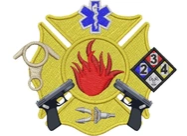Tactical Emergency Casualty Care (TECC) course teaches EMS practitioners and other prehospital providers how to respond to and care for patients in a civilian tactical environment.

Tactical Emergency Casualty Care (TECC) course teaches EMS practitioners and other prehospital providers how to respond to and care for patients in a civilian tactical environment. The course presents the three phases of tactical care and integrates parallel EMS nomenclature:
The 16-hour classroom course includes all new patient simulations and covers the following topics:
Scott is a 33 year veteran of the South Carolina emergency services community and is the current Fire Chief at Westview-Fairforest Fire Department. He has 5 years of Law Enforcement experience which includes SWAT MEDIC experience and has been a Nationally Registered Paramedic for over 30 years. He is also an experienced CPR/FA, EMR, EMT, Paramedic ,TECC and STOP the BLEED instructor.
As a active member of the NRA and a strong supporter of the 2nd Amendment, I believe that every citizen should own, carry and train with their firearm to be prepared to defend themselves and/or their family from a deadly force threat.
© 2025 coursetakers.com All Rights Reserved. Terms and Conditions of use | Privacy Policy